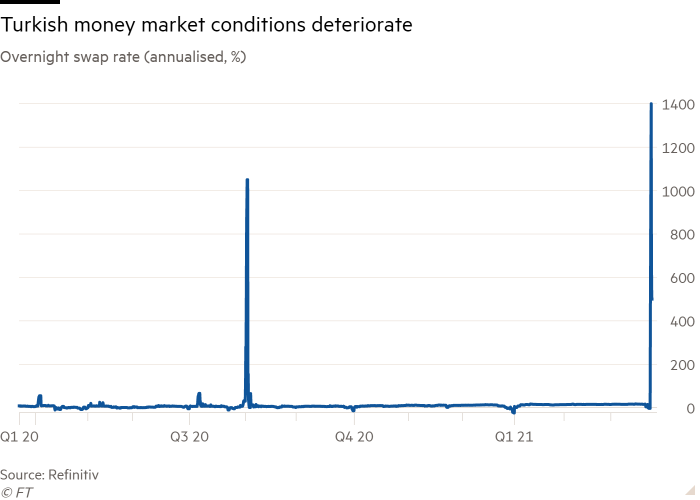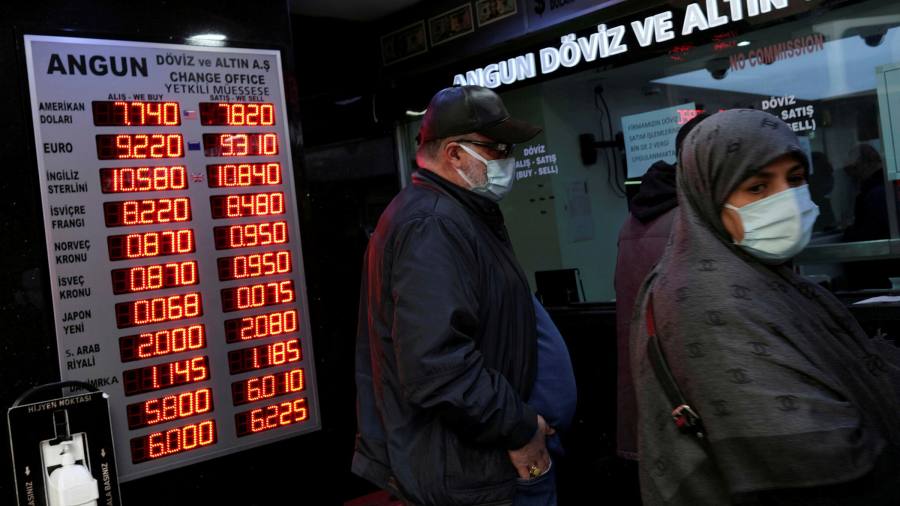[ad_1]
Turkey’s money market showed signs of stress on Tuesday, a day after the president’s firing of a respected central bank chief rattled investors and sparked heavy selling in the country’s assets.
The offshore overnight swap rate, the cost to investors of exchanging foreign currency for lira over a set period, soared to an annualised 1,400 per cent on Tuesday, according to Refinitiv data. It had eased to a still-elevated 500 per cent by 3pm in Istanbul.
Analysts said the big increase was a sign it was becoming more difficult for foreign investors to hedge their exposure to lira assets, unwind their bullish positions or bet against the currency. The lira tumbled as much as 14 per cent on Monday, before finishing the day with a 7.4 per cent decline.
“Foreign investors are trying to liquidate long lira positions in a rush this week following the unexpected development over the weekend of the dismissal of the [central bank] governor,†said Onur Ilgen, head of treasury at MUFG Bank Turkey. He said this had triggered a “significant liquidity squeeze in the offshore lira swap marketâ€.
“This is a short-term measure to reduce lira fluctuations overseas,†said Enver Erkan, economist at Tera Securities in Istanbul. “The
goal may be to make it harder for overseas institutions to find lira
or make the lira expensive so that short positions are costly.â€
He described the sharp rise in the overnight swap rate as an indication of “panic moves†in the short-term market. Similar conditions took hold during volatile periods in 2019 and 2020.

Erkan said it was unlikely the freeze in the funding market was part of a formal policy from the government, but rather a more informal move by local banks.
Timothy Ash at BlueBay Asset Management in London agreed the measures would make it more difficult to bet against the lira. He said it was hurting investors “already invested in Turkish lira assets as it makes it so expensive to hedge and reduce exposureâ€.
Another analyst at a large international bank, who asked not to be named, said he was “seriously concerned†this was an attempt to “not provide sufficient lira liquidity not only to prevent speculators from betting against the lira, but more importantly to prohibit foreign investors from closing their bullish positions on Turkish assets and substantially slow down the pace of capital outflowsâ€.
He said this would effectively be a “form of capital controlsâ€, which would “cause even more damage to Turkey’s reputation and will not prevent the lira from weakening significantly in the coming weeksâ€.
Investor sentiment had been brightening since November when Naci Agbal was appointed head of the Turkish central bank. He had sharply raised interest rates in an attempt to slow inflation, which is running at about 15 per cent. A 2 percentage point increase to the country’s policy rate last Thursday also helped to push back against a rise in developed market yields, which has dented the appeal of emerging market assets.
But President Recep Tayyip Erdogan ousted Agbal over the weekend and installed Sahap Kavcioglu, a little-known academic who has echoed the president’s unusual views that high interest rates cause rather than slow inflation. The shake-up has sparked a severe market reaction.
Turkey’s main stock index, the Borsa Istanbul 100, has lost about a tenth of its value this week, while the banks sub-index has tumbled about 15 per cent.
The country’s lira-denominated debt remained under pressure on Tuesday, with the 10-year yield sitting at 18.4 per cent, from 13.6 per cent at the end of last week. A dollar bond maturing in June 2031 traded with a yield of 7.36 per cent, down from Monday’s highs but up sharply from Friday’s level of 6 per cent.
[ad_2]
Source link





